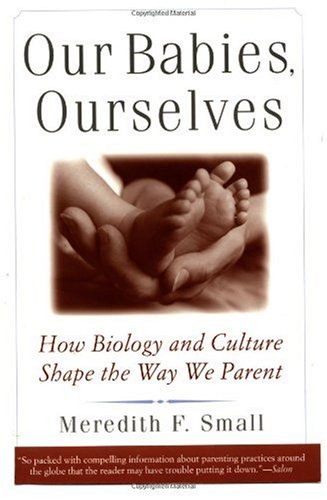How the Mother-Infant Bond Grows Over Time
Evidence that there is some sort of heightened awareness by mothers, caused either by biology or emotions, is seen in a mother's ability soon after birth to recognize her infant by smell and voice alone. In several studies, mothers who had spent only a few hours with their newborns were able to smell out their babies when comparing their shirts with the shirts worn by other babies. Mothers are also pretty good at hearing their infants. Women with new infants in wards usually sleep through the cries of other infants but wake up immediately upon hearing their own babies' cries. New mothers are also good at picking out the recorded cries of their own infants, sounds that are spectrographically as individualized as fingerprints. They can also correctly identify the type of cry. be it hunger or wet diapers, when recorded under varying circumstances and played back.
Although this evidence points to an innate maternal instinct for identifying and interacting with infants, it is not a fixed interaction. In fact, all these studies show that with time, mothers get better at smelling and hearing their infants, and that mothers with previous children are better at it than first-time mothers. Although women might come equipped with some of these abilities, their accuracy and skill at using them is improved with experience and learning; this would be expected in a species such as ours, in which learning plays such a major role in behavioral patterns. Even maternal attitude—a positive attitude toward children and one's own baby, which should be the most primate maternal response—changes with experience. In one study, 68 women were interviewed three times: when they were pregnant, three days after birth, and when their children were over a year old. These mothers expressed a definite increase in positive attitude toward their babies—^with time, they became more and more attached.
Notes:
Mothers grow more attached to their babies as their interactions grow so that the mother can better identify her baby and respond to its cry.
Folksonomies: parenting pregnancy childbirth mother-infant bond
Taxonomies:
/family and parenting/babies and toddlers (0.506716)
/family and parenting/children (0.391198)
/health and fitness/disease/aids and hiv (0.263736)
Keywords:
mothers (0.926335 (positive:0.094523)), infants (0.767787 (negative:-0.065282)), innate maternal instinct (0.760760 (positive:0.286167)), primate maternal response—changes (0.729165 (positive:0.304265)), positive attitude (0.709368 (positive:0.527007)), attitude—a positive attitude (0.699730 (positive:0.435681)), New mothers (0.695975 (negative:-0.489038)), first-time mothers (0.694563 (positive:0.560663)), new infants (0.643074 (negative:-0.617293)), Mother-Infant Bond (0.608694 (neutral:0.000000)), babies (0.603112 (negative:-0.394235)), wet diapers (0.587359 (neutral:0.000000)), definite increase (0.577576 (positive:0.618333)), major role (0.571089 (neutral:0.000000)), behavioral patterns (0.569510 (neutral:0.000000)), cries (0.564745 (negative:-0.567448)), previous children (0.563897 (positive:0.560663)), babies—^with time (0.560615 (positive:0.618333)), women (0.503754 (negative:-0.617292)), evidence (0.480314 (positive:0.369254)), birth (0.476332 (negative:-0.374587)), baby (0.475932 (positive:0.435681)), shirts (0.474412 (negative:-0.466453)), studies (0.474192 (neutral:0.000000)), experience (0.461530 (positive:0.449649)), smell (0.451095 (negative:-0.374587)), smelling (0.445510 (positive:0.542620)), wards (0.445183 (negative:-0.617292)), newborns (0.443159 (negative:-0.466453)), fingerprints (0.443033 (neutral:0.000000))
Entities:
three days:Quantity (0.010000 (neutral:0.000000))
Concepts:
Infant (0.989257): dbpedia | freebase | opencyc
Childbirth (0.701016): dbpedia | freebase
Breastfeeding (0.610530): dbpedia | freebase | yago
Maternal bond (0.589746): dbpedia | freebase
Pregnancy (0.588656): dbpedia | freebase | opencyc
Infant mortality (0.509820): dbpedia | freebase
Mother (0.499113): dbpedia | freebase
Infancy (0.469892): dbpedia






